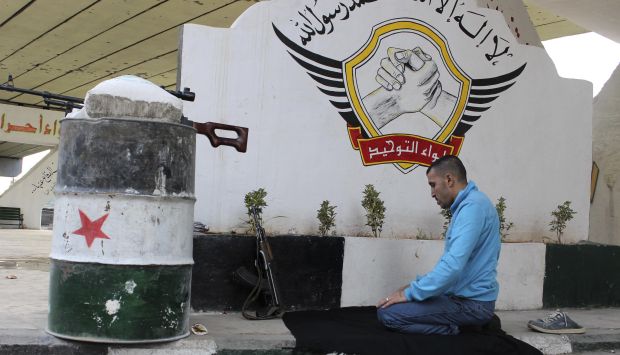
A Free Syrian Army fighter prays at a checkpoint in Aleppo October 18, 2013. (REUTERS/Molham Barakat)
Beirut, Asharq Al-Awsat—Syrian rebel groups have expressed dismay at recent statements issued by Hamas leader Khaled Mishal in which he criticized the military and sectarian dimensions of the Syrian conflict, calling on the Palestinian group to stop interfering in Syria’s domestic affairs.
In a recent statement, Mishal urged the “groups fighting in Syria to direct their rifles towards Palestine,” announcing his “support of a peaceful solution in Syria that guarantees the freedom and dignity of people.”
“Peoples have the right to rise up for their rights, but this must be done through peaceful means,” Mishal said in reference to Syria’s armed rebels. However the Hamas leader affirmed that he “opposes sectarian violence, regardless of its source.”
Mishal’s remarks prompted the Army of Islam, one of the most active rebel groups in Rif Dimashq, to strongly criticize the Palestinian leader, accusing him of “having links with Iran.”
Last week, the political bureau of the Army of Islam’s general command said that it is “more keen than Mishal and his ilk to restore Al-Aqsa Mosque.”
The statement added: “He who performs jihad out of his office should not offer advice to those in the trenches.”
Although a large number of the Syrian opposition hail from the Muslim Brotherhood—Hamas’s mother organization—a number of senior figures did not hesitate to criticize Mishal and his recent comments.
Speaking exclusively to Asharq Al-Awsat, Brotherhood representative to the Syrian National Council Mulham Al-Droubi said that Hamas’s “fluctuating attitude towards the Syrian Cause is a natural result of the international, regional, and Arab circumstances the Palestinians are going through.”
He added that the fluctuating political situation in the Arab world prompts the Palestinian group to constantly shift its allegiances.
Droubi advised Hamas to keep out of the Syrian crisis and avoid “interfering in Syrian affairs or giving instructions to the fighters on the ground.”
“The Syrian revolution began peacefully but the violence and brutality of the regime pushed it towards taking up arms. The sectarianism which Mishal has asked us to avoid is a result of the regime’s actions,” Droubi told Asharq Al-Awsat.
Mishal’s latest remarks came after he had previously announced his support of the Syrian uprising and people’s demands, contrary to other senior Hamas leaders such as Musa Abu-Marzuq and Mahmoud Al-Zahhar. Both Abu-Marzuq and Zahhar had adopted a more moderate position, calling for a political solution to the Syrian crisis to avert the bloodshed and violence dominating the scene.
Lebanese political analyst Ali Al-Amin informed Asharq Al-Awsat that Hamas would most likely increasingly follow Abu-Marzuq and Zahar’s stance towards the Syrian crisis. He added that Hamas will take a “more neutral position on the Syrian file in a bid to facilitate its return to Iran’s embrace.”
“Tehran will become Hamas’s primary protector following the defeat of the Muslim Brotherhood project in Egypt,” Amin added.
The Lebanese political analyst said that Hamas’s return to the Tehran axis will serve Iran’s interests, as the Iranians can then use the Palestinian group as a “cover for its influence in the Arab [region].”
For his part, Hamas spokesman in Lebanon Ali Barak told Asharq Al-Awsat: “Our relationship with Iran had not been interrupted and is linked to the Arab-Israeli conflict as well as the project of resistance.”
He denied “any connection between this strategic alliance and [Hamas’s] position on what is going on in Syria.”
Hamas’s relations with Syria gradually deteriorated following the eruption of the Syrian crisis, prompting senior figures to leave Damascus. The Syrian regime has accused Hamas of supporting the opposition, including by offering the rebels military training.
